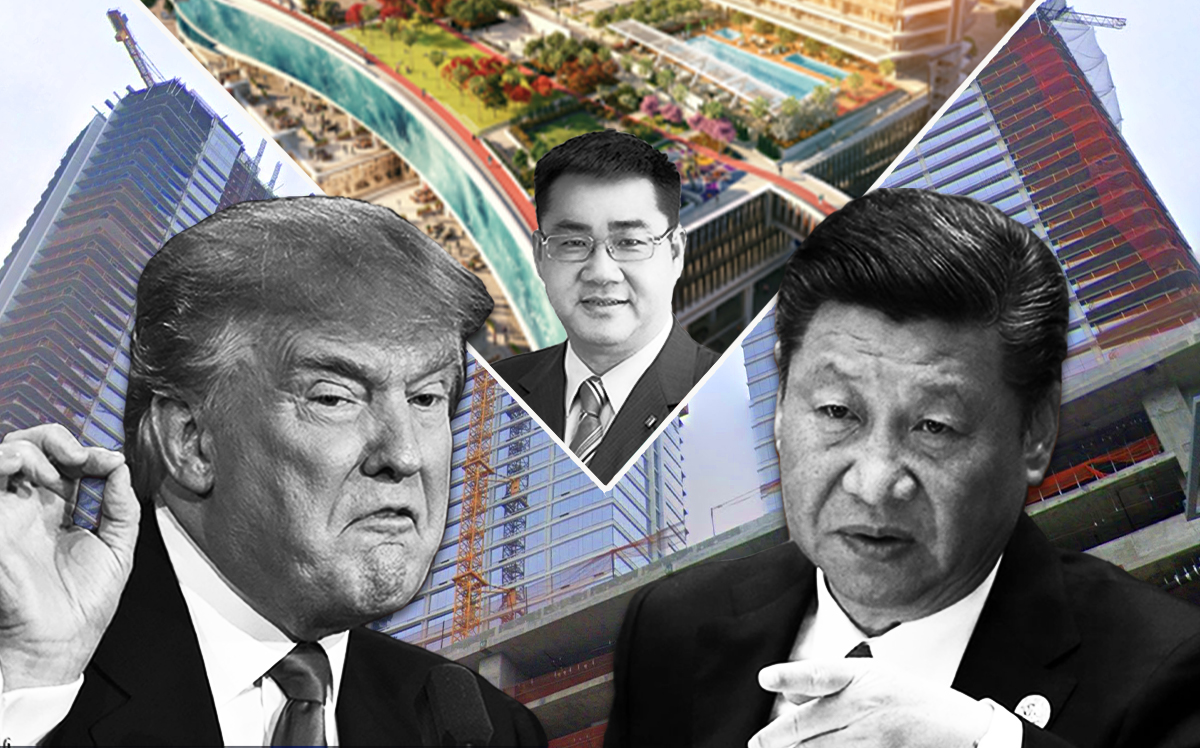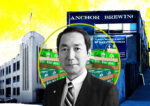Trending
Glass, steel and uncertainty: Stalled Oceanwide Plaza megaproject faces mounting challenges
Seven months after Oceanwide Holdings Company suspended work on its $1B mixed-use development, escalating trade tensions between the US and China have added to the project’s uncertain future

UPDATED, August 27, 9:02 a.m.: Looming over Staples Center and directly across South Figueroa Street stand three glass skyscrapers. They are part of a $1 billion mixed-use megaproject from Beijing-based Oceanwide Holdings Company that promises hundreds of condominiums, a five-star hotel and a massive retail complex.
Though the towers topped out in April 2018, the project is far from complete. Cranes are still bolted to all three buildings, the multistory mall is a concrete skeleton and the block-long site is still a construction site.
Oceanwide Plaza, as it is called, has been suspended since late January when Oceanwide abruptly halted work without warning. A rumbling of activity has periodically been reported at the development, and last week crews were spotted doing minor construction.
When work began in 2015, Oceanwide was part of the free-flowing Chinese capital that poured into large-scale Los Angeles real estate projects. Other China-based firms had similar massive projects, like Greenland USA’s Metropolis, CCCG Overseas Real Estate’s Grand Avenue and Dalian Wanda Group’s One Beverly Hills.
But as the Chinese government began tightening its belt on foreign investment, that flow of cash turned to a trickle. Overall, Chinese investment in Los Angeles fell from a peak in 2016 of $1.5 billion to $211.8 million in 2018, according to Real Capital Analytics. Last year, Dalian Wanda sold its stake in the long-planned One Beverly project.
After Oceanwide suspended construction on its three-tower development, the company’s only statement was that it was recapitalizing the project. Work would resume a couple of weeks later, company officials said, and the project would be done by 2020.
Fast forward to today, and the enormous construction site remains largely empty, a mass of steel, concrete and uncertainty.
The Trump administration’s escalating trade war with China led to higher tariffs and created an unstable economic environment for companies like Oceanwide, industry pros say. Rising construction costs and a U.S. economy that could be headed into recession has only added to the uncertainty.
Chinese developers will likely face a “much higher pressure” on their foreign investments as the country’s currency, the renminbi, depreciates and the Chinese government continues to increase capital controls, said economist William Yu. “I don’t think it’s possible to find a way to move the money out of China right now,” said Yu, who focuses on the L.A. economy and forecasting at UCLA’s Anderson School of Management. That could require Chinese companies like Oceanwide to find alternate sources of financing.
Anthony Rinaldi, CEO of construction firm Rinaldi Group, said Oceanwide’s long project delay could spell potential doom for a development of that size and scope.
“Once you get to a point that a project is eight months behind, that project is dangerously if not fatally affected at this point,” he said. Rinaldi attributed that to higher construction and labor costs, plus the tariffs that “are affecting material prices.”
Oceanwide Plaza’s three towers are projected to house 504 condo units and a 184-key luxury Park Hyatt hotel. In addition to the two 40-story buildings and one 49-story tower, there will be a 166,000-square-foot mall. The Mark Company was tasked with selling the condo units and Kennedy Wilson was tapped to lease its retail component. Representatives from the two firms did not return requests for comment.
The project isn’t the only one that Oceanwide has delayed. In May, it stopped work at the massive Oceanwide Center in San Francisco as it looked for additional financing for what would be that city’s second tallest tower. The project calls for 265 residential units, a 169-key Waldorf Astoria and 1 million square feet of office space. It had been targeted for a 2022 opening.
Mounting debt
While the Chinese developer appears to have funded Oceanwide Plaza itself, the DTLA project is now saddled with debt. Oceanwide did not return repeated calls for comment.
As of the spring, subcontractors said Oceanwide owed them nearly $100 million for work performed at the downtown construction site. Those firms filed a total of nine mechanic liens, which are placed against a property as compensation for unpaid work. Webcor Construction, a subcontractor of multinational giant Lendlease, filed the biggest claim of nearly $53 million.
Oceanwide has also had to contend with an ongoing FBI investigation into potential crimes involving elected city officials and development. Last year, federal authorities sought records related to Oceanwide’s development activity. The investigation appears to center around L.A. City Councilman Jose Huizar, who the FBI is investigating over a series of contributions developers made to him, his wife and affiliated causes.
Despite the problems, industry pros who have been following the Oceanwide saga say all is not lost. One of the ways to jumpstart the project, they said, would be to bring in a partner. That, however, would not be an easy task.
The substantial liens mean Oceanwide would first have to pay past due contractor bills. Contractors can also sue to foreclose if the owner continues to refuse payment.
Adding to the uncertain economic environment is that lenders are more cautious about underwriting major projects, said Eric Sussman, a UCLA Ziman Center for Real Estate professor and real estate investor.
“Any amount of uncertainty in markets is going to have an economic impact, but we’re talking about [seven-month] delay now,” he said. “It sounds like there may be broader issues.”
Stephen Cheung, executive vice president of the L.A. County Economic Development Corporation, said it’s going to be a “huge challenge” for Chinese firms that operate in the U.S. to effectively leverage their resources and get a good rate on financing.
“Our fear is that if these Chinese investors who have been here since the mid-2000s are not able to complete their projects, that’s going to send a bad signal that Chinese companies can’t make it here,” Cheung said. He is hoping the Oceanwide Plaza project moves forward quickly. “But if not, it will become an eyesore,” he added.
Others, however, remain optimistic.
“It’s a significantly scaled project, which is three-quarters of the way done — that’s too much value to leave on the table,” said Nick Griffin, executive director of the Downtown Center Business Improvement District. “When there’s value on the table, people tend to take it.”




